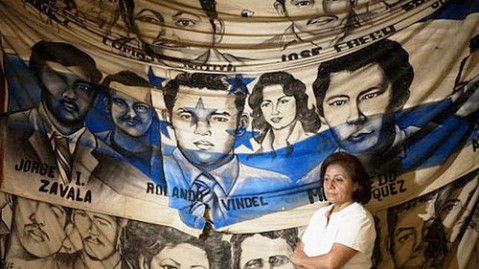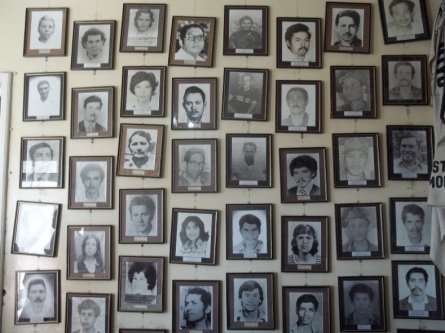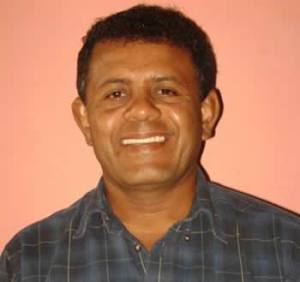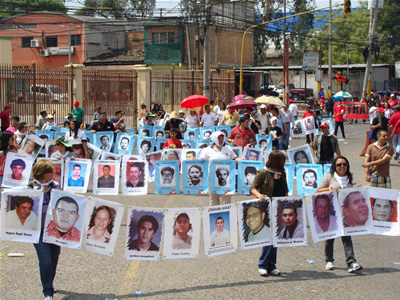On August 30, the National Day of the Detained-Disappeared was commemorated in Honduras. In a forum organized by COFADEH (Committee of the Families of the Detained and Disappeared in Honduras) coordinator Bertha Oliva, explained that the choice of the date for this national day of commemoration, emerged from a 1984 meeting of the Federation of the Families of the Detained and Disappeared in Latin America (FEDEFAM). The date was chosen because August was the month in which the greatest number of forced disappearances, carried out by agents of various States in Latin America in the framework of a plan supported by the United States, to target leaders, human rights defenders and social movements. Bertha Oliva added, “This is why, during that congress in 1984, we declared that we would work to achieve a National Day of the Detained and Disappeared in each country. This was a very difficult objective to propose in 1984; we were in the midst of the full implementation of the National Security Doctrine.”
COFADEH, was formed in 1982 by 12 families, victims of forced disappearance, for one clear objective: to recover their family members who had been disappeared by the State – alive. Since this time, COFADEH continues to struggle tirelessly against impunity, for justice and respect for human rights. In 2002, the organization achieved the official recognition of August 30th as the National Day of the Detained-Disappeared in Honduras by legislative decree.1
COFADEH has registered 184 cases of forced disappearance from the end of the 70s to the beginning of the 90’s; in addition there are dozens of disappearances that were never reported. James («Guadalupe») Carney, a US Jesuit priest, is one of the 184 registered cases; his face appears with the disappeared at COFADEH and in the vigils that are held each month. COFADEH, in coalition with other organizations, has accompanied these cases appealing to the national and international systems of justice. Several of their cases involving the murder and forced disappearance of social movement leaders, reached the Inter American Court of Human Rights.
The Inter American Court finds the State of Honduras guilty of the crime of forced disappearance
The first two decisions of the recently created Inter American Court of Human Rights, resulted in findings of guilt on the part of the State of Honduras for forced disappearance. In 1988, in its first sentence, the Inter American Court found the State of Honduras guilty of the torture and forced disappearance of a young student, Manfredo Velázquez Rodríguez. The sentence affirmed that “the existence of a practice of carrying out forced disappearances or tolerating the practice on the part of Honduran authorities between 1981 and 1984.” Later, in the case of Saul Godínez Cruz, in 1989, the State was again found guilty of forced disappearance by members of state security forces. The Courts’ declaration of State responsibility for kidnapping, torture and forced disappearance, was historic for Latin America; it provided legal recognition of what was already known in Honduras and was denied by authorities. As of 1981, forced disappearance became State policy in the framework of the Doctrine of National Security.
In these cases, the Court ordered the State to compensate the families of the victims, to investigate the acts and to punish those responsible. In 2003, the State of Honduras was found guilty again by the same Court, for the disappearance and death of Juan Humberto Sánchez, in 1992. However, despite the guilty sentences, none of these cases have been investigated nor have those alleged to be responsible for the crimes be tried in court.
Impunity
Full impunity exists in the cases of political assassinations and forced disappearances of the “lost decade.” In the 80s, there were judicial investigations but all of those presumed to be guilty, were dismissed. Later, between 1995 and 2000, new cases of forced disappearance were opened however, of all of the cases from the 80s, there was only one guilty sentence in the case of the temporary forced disappearance of six students, in which the Ex-director of the National Investigation Directorate, Juan Blas Salazar Meza, was sentenced to two years in prison. 2
Today, the authors of human rights violations in the 80s, rather than fearing the possibility of prison, continue to be free, some of them work as advisors on security issues.
16 new cases of forced disappearance
In addition to all of the crimes of the past that remain in total impunity, recently the specter of this crime against humanity became a reality for Hondurans once again. Following the 2009 coup, COFADEH has documented 16 cases of disappearance as the country experiences a resurgence of this practice in a context of repression of social protest and imposition of terror.
One emblematic case is that of Reynaldo Cruz Palma, who was forcibly disappeared on the very day dedicated to commemorate the Detained and Disappeared, August 30, 2011.
José Reynaldo Cruz Palma was a community leader, the President of the Patronato of the Colonia Planeta, San Pedro Sula. Just two days before he was disappeared, he and his wife had taken actions on behalf of 10 people illegally detained in their neighborhood. Two months earlier, Reynaldo had denounced on television, police abuse on which occurred during an operation in his neighborhood resulting in the death of seven alleged gang members.
That day, August 30th, he was on a bus near San Pedro Sula when he was abducted by armed men. He was taken by force in two vehicles, including one belonging to the preventative police. Since that day there has been no trace of him. His family members went to the police that same day, but the police refused to take their testimony. The family requested support from COFADEH and together, they filed all of the legal complaints. However, the only response is that the case “is under investigation.” However, no arrest warrant has been issued and there is no list of suspects. Reynaldo’s family holds the police responsible for the disappearance of their loved one. Due to the persecution experienced after denouncing his disappearance, including threats and security incidents, his wife Nubia Carbajal had to abandon the country in 2013.3
Re-opening cases from the 80?
On August 28, the Coordinator for the Special Prosecutor for Human Rights of the Public Ministry, Soraya Morales, announced the re-opening of investigations into the deaths that occurred during the decade of the 80s with the objective of continuing investigations of 184 cases. She announced that “a unit has been created to respond to these cases that have been in the office of the Special Prosecutor for Human Rights and have not advanced; there are some cases that have been processed and others that have not. A team has been created for this.”
The announcement by the Special Prosecutor was received with caution on the part of COFADEH and other human rights defenders. This announcement was made on the day of a private supervision hearing on compliance with sentences of the Inter American Court of Human Rights against the state of Honduras.4 The announcement also comes, just as Honduras must present a report to the UN Committee on forced disappearance which has been delayed. In a context of extreme impunity, human rights defenders ask if the announcement to re-open cases reflects the government’s attempt to create an image of respect for human rights before international organizations rather than a real commitment to justice and to end impunity.
As long as cases of forced disappearance from the past remain in impunity and new faces, of those forcibly disappeared today, appear on the walls and vigils of COFADEH, the organization will continue its efforts for truth, justice and an end to impunity.
To learn more about forced disappearance in Honduras:
-
COFADEH website: cofadeh.hn o http://www.cofadeh.org/html/desaparecidos/index.htm
-
Report by former National Human Rights Commissioner, Leo Valladares, “The Facts Speak for Themselves” report on the disappeared in Honduras, 1980-1993.
-
Article on the forced disappearance of Reynaldo Cruz Palma, by Daniel Valencia Caravantes “Los desaparecidos no existen en el país más violento del mundo”
1 At the international level, in 2010 the UN General Assembly decided to declare August 30th, International Day of Victims of Forced Disappearance.
2 See this case in http://www.cofadeh.org/html/violadores%20ddhh/juan_blas_salazar.htm
3 Article on several cases of forced disappearance following the coup: http://www.defensoresenlinea.com/cms/index.php?option=com_content&view=article&id=3711%3Aen-agosto-se-registra-mas-casos-de-desaparicion-forzada&catid=37%3Amem-y-imp&Itemid=150
4See article on Conexihon : Honduras reports to the Inter American Court of Human Rights




Leave a comment